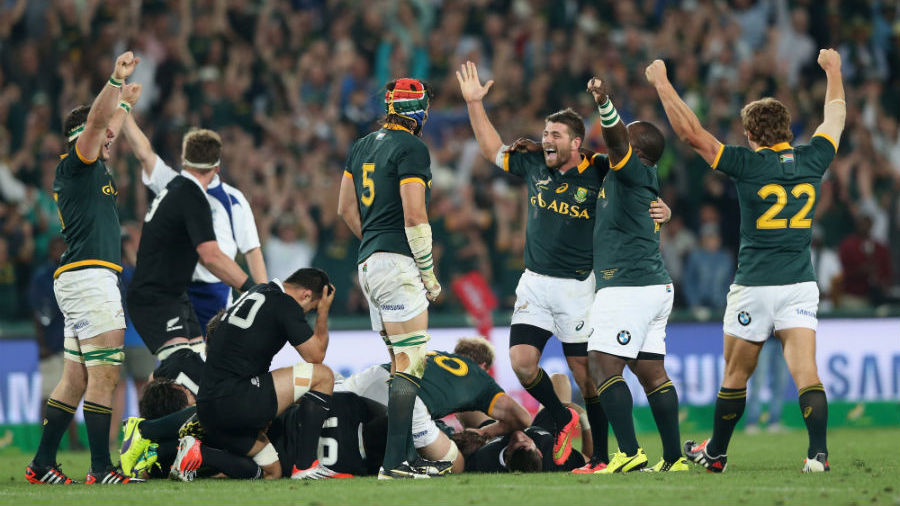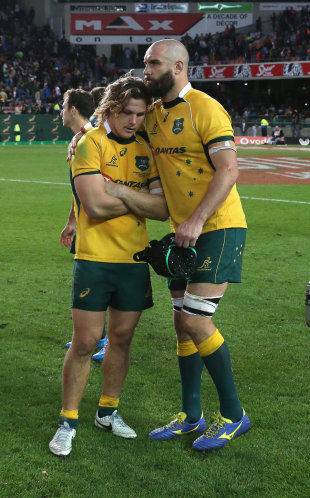|
International Rugby
The changing expectations of the big three
John Mitchell
November 6, 2014

South Africa celebrate their win over New Zealand © Getty Images
Enlarge
While winning is the number one priority for the All Blacks, Springboks and Wallabies on their respective year-end tours, their coaches will aim to manage player workload in the matches against weaker opposition and create competition and depth by selecting those who impressed during the domestic season. By now, most of the top team coaches will be aware of their best matchday squad. As such, they will make use of the autumn internationals to examine their positional mix and which other players could realistically make their 30-man Rugby World Cup squads. Moreover, as a mentor, you don't want someone who is not a regular starter to prove a disruptive force off-field, and one of your tasks is to effectively manage fringe players who don't get much game time. In terms of strategy, it will be interesting to see how ambitious the "big three" southern hemisphere sides will prove to be before the advantage line and what they can do behind it. Most especially when playing against England and Ireland, who are both in possession of well-organised and structured defence systems.
While the All Blacks won the June series against England three-nil, it took some exceptional first-phase back play to penetrate the visitors' defence. England boast the ability to slow down the opposition ruck ball and generate a lot of line speed as a result. However, during the November Tests, I believe it will be less about what the southern hemisphere teams do in front of the advantage line and more about their ability to get in behind the defence line by executing their kicking games, launching special first-phase plays and making effective use of turn-over ball. As far as Stuart Lancaster's charges are concerned, they play with far greater confidence when their forwards provide a solid platform, so the All Blacks and Springboks will be looking to assert scrum dominance. Meanwhile, the Wallabies, who don't possess a strong scrum, will be pleased to achieve parity. The Springboks and Wallabies will also be playing Ireland this month. The Irish won the 2014 Six Nations because they made use of a dominant lineout drive, which former forwards coach John Plumtree deserves credit for, were disciplined on defence and accurate on first-phase attack. They appear to be a very organised side, with head coach Joe Schmidt meticulous in his planning. While it will be interesting to see how Ireland performs without the talismanic Brian O'Driscoll, they should still prove a tough nut to crack in Dublin. As against England, the southern hemisphere teams will need to focus on getting in behind Ireland's defence rather than on what happens before the advantage line. Wales, meanwhile, have lost a staggering 24 out of 25 matches against the All Blacks, Springboks and Wallabies under head coach Warren Gatland, and will face all three foes this month. In my opinion, the worrying factor for Wales is that they are an ageing side that has probably already peaked. They will play a lot off nine, and fullback Leigh Halfpenny, who recently returned from a shoulder injury, will be critical for them. He is an exceptional goal-kicker, excellent under the high ball and dangerous with ball in hand on the counter-attack. 
The Wallabies have ground to make up
© Getty Images
Enlarge
However, what concerns me is that little seems to have changed in the Welsh team. It's ostensibly the same coaching group and the same players, so they will probably keep producing the self-same results. I'm not sure how much more they can get out of the aforementioned protagonists. They urgently need to find another X-factor player, like Halfpenny, which is difficult to do when you have a small rugby-playing population from which to draw. I don't believe Wales will have the beating of either the All Blacks or the Springboks, although the latter will be without their overseas-based players because that particular match falls outside of the IRB Test window. As a result, Springbok coach Heyneke Meyer will have to select a mix of first and second-choice players for the Cardiff clash, which I believe will prove a good challenge for him and his fellow selectors. In fact, it could end up helping Meyer if the Springboks suffer a spate of injuries at the 2015 World Cup and are forced to pick from whoever is left standing. Wales' best chance to claim a big scalp will be against the Wallabies, who they will also meet during the pool stage of the World Cup at Twickenham. I believe the respective southern hemisphere coaches will keep their cards close to their chests, in terms of team evolution, ahead of the World Cup. While I would welcome the sides surfacing some new ability, by and large, I expect them to get by in November with the structures and methods developed this year. However, what I know for sure is that the All Blacks, under the tutelage of Steve Hansen, will continue to be encouraged to play what's in front of them, with a greater emphasis placed on mastery of execution. * Mitchell's explosive new book, Mitch - The Real Story, is available at www.amazon.co.uk (Kindle edition) and www.kalahari.com (print and eBook). Follow him on Twitter @mfactorcoaching © ESPN Sports Media Ltd
| |||||||||||||||
Live Sports
Communication error please reload the page.
-
Football
-
Cricket
-
Rugby
-
- Days
- Hrs
- Mins
- Secs
F1 - Abu Dhabi GP
Abu Dhabi Grand Prix December 11-131. Max Verstappen ()
2. Valtteri Bottas (Mercedes)
3. Lewis Hamilton (Mercedes)
4. Alexander Albon ()
5. Lando Norris ()
6. Carlos Sainz Jr ()
-
ESPNOtherLive >>
Boxing - Nelson v Wilson; Simmons v Dickinson; Joshua v Gavern (Metro Radio Arena, Newcastle)
Golf - Houston Open
Snooker - China Open
Tennis - Miami Open

